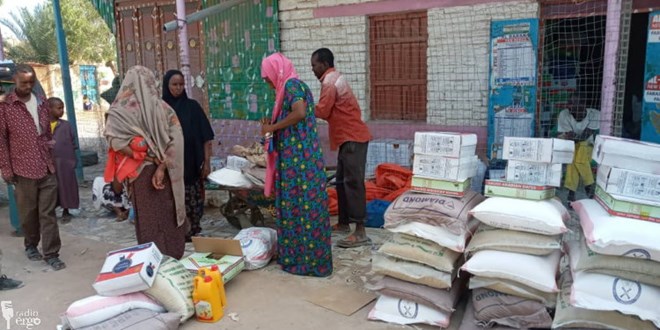
Saturday January 14, 2023

People collecting food aid from a store/File photo/Ergo
(ERGO) – Sharifo (not her real name) lives in Abag-beeday village, eight kilometres from the besieged town of Hudur in southern Somalia’s Bakool region. Since November 2022, she has been receiving food aid that has enabled families like hers to remain in their village despite the terrible drought and the pressures of living in an area cut off by Al-Shabab.
This single mother and her four children are among 6,820 families getting $90 a month in aid from local NGO, Mandhere Relief and Development Organisation (MARDO).
They take their cards to certain stores to get food. However, due to fear of the Al-Shabab authorities who have banned foreign aid in their areas, they must be very careful.
Sharifo goes back and forth to the store about four times a day taking three hours to carry food items in discreetly to her house. The food is a relief for her destitute family, who can now eat two meals a day.
“We take three halves of sugar, flour and rice. I carry the food on my back and sneak it home. If we got the $90 in cash I would even pay for my children’s fees, buy them books and clothes, and even buy medicine. We would prefer getting cash,” she said.
Before she started getting the aid, Sharifo sold merchandise smuggled into the town by businesswomen, earning 10,000 to 20,000 Somali Shillings ($1-$2) a day from sales.
“People bring in food, clothes, and vegetables. Vegetables was the easiest one, I would tell them to bring them for me to sell. I would keep the profits and pay back the supplier. At night I was able to buy my children a cup of millet and that’s how we lived,” she said.
This mother owns a four-hectare farm in Abag-beedey, where she planted millet in the last deyr rainy season and is hopeful of harvesting this month.
Another villager Saida (not her real name) living in Garasweyne, 45 kilometres from Hudur, is also receiving aid and gets her food from a store 20 kilometres from her house.
This mother of eight said the food aid has been indispensable for their family. They now get three meals a day whereas they were surviving on one meal a day or sometimes every two days.
“We are facing hardships, our livestock became worthless while the children were hungry, and you could barely do anything about it. Life was hard. We had some days when we ate nothing at all. Thank God we can now get rice, pasta and cooking oil,” she said.
Saido’s husband is elderly and sick, and she has to take care of him as well as the children. They used to live off their 23 cows and 10 goats, although only three cows are left.
“We got our income by selling our goats and cows. The farm lands were hit by drought and we didn’t grow anything for four years,” she noted.
Five of her children are now in school. She is paying 300,000 shillings ($10) for each of them and has been selling animals to support their education.
The MARDO coordinator in Hudur, Mohamed Adan, told Radio Ergo they selected these families due to their impoverished situation. He noted that the aid is intended to enable people to stay in their villages instead of migrating from the rural areas and becoming internally displaced in the town.
This cash aid, which is supported by the UN’s World Food Programme, is loaded monthly onto their cards which are valid at certain stores. The aid is set to continue until May 2023.